For many years I have been learning about living off of the land with minimal external input required - to be self sufficient. It started with prepping. The longer the span of time that I would question myself about being prepared for, the closer I would come to a self-sufficient homestead being the answer. During three years of my wife and I owning and operating a pizza delivery business, we were fortunate enough to see our house price double in a real estate bubble - my wife asked me if I wanted to retire and move out to the country - I said For Sure Honey!
Away we went on our Off-Grid Living Adventure.

In the picture above is my cousin's sailboat, we're on a nearby lake with my son guiding the way.
What is Off-Grid ?
When you tell your friends or relatives that you are selling your house and business and moving out to a piece of land in the country - off-grid - a variety of assumptions and scenarios may surface in their minds. It would usually involve a shanty or a broke down camper and three people struggling to live their lives. I do have a camper, but I only use it for on-site recreation and to store tools. The camper was the original plan until we built our house, but the 3-1/2 acre property was fortunate enough to come with a well built, insulated, wood heated, and solar powered cabin.
My easiest way to explain away their worries of my motivations to move off-grid was to say "I Don't Like Bills."
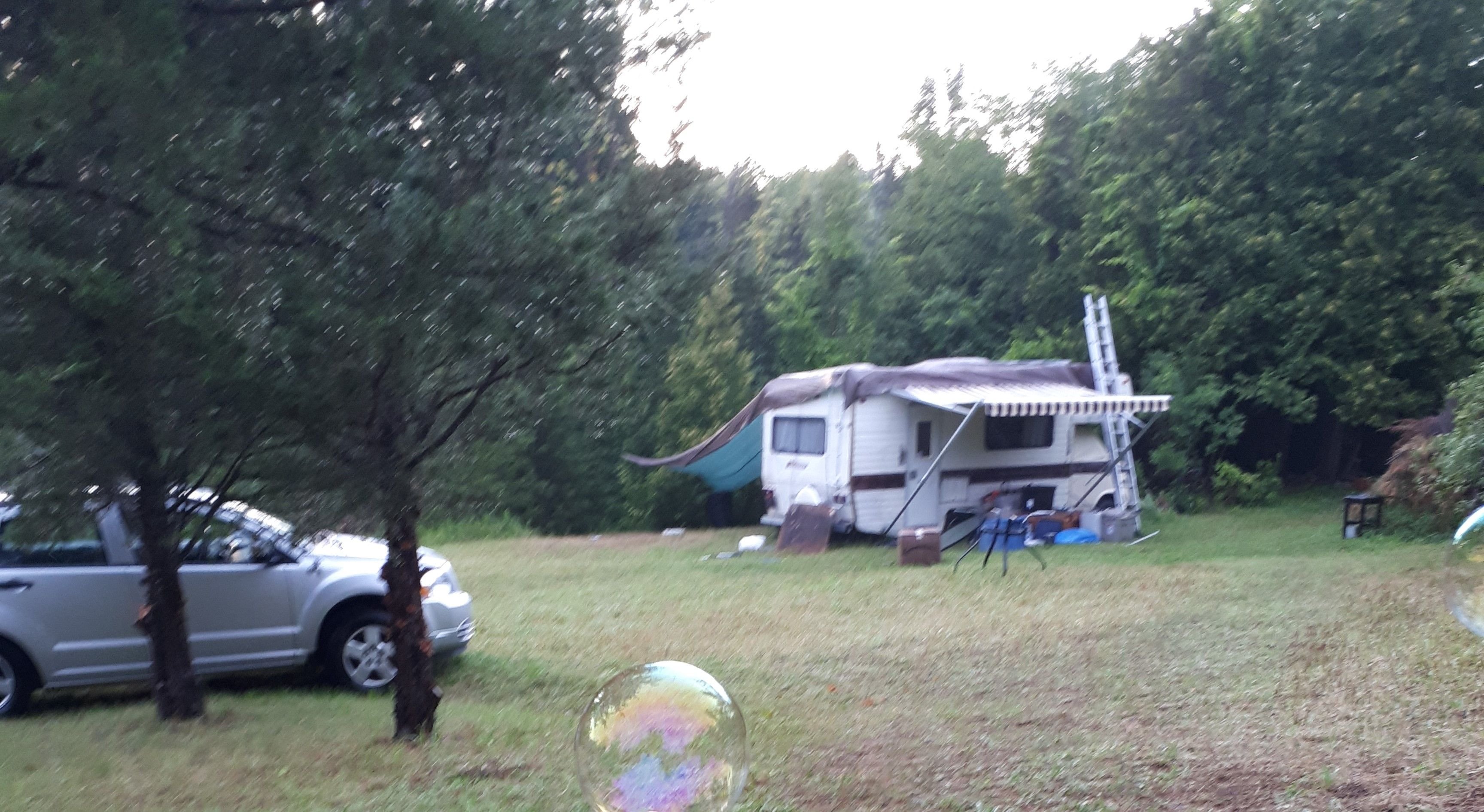
I don't like mortgage payments, rising electrical grid costs, gas bills that charge $50 per month even if I use no gas, cable TV bills when I'm mostly watching Netflix, rising water bills, large town property tax bills, etc - the modern bills for conveniences, I was done with them. Especially if having them meant I had to spend time away from my family to pay for them. I was fortunate to have things work out this way for me. Like my cousins would say - I'm Living the Dream.
For modern convenience electricity, we do have a hybrid solar power setup.
Solar panels, battery banks, inverters for household voltage, gas generator and battery charger for backup. The wind turbine is still in experimentation phase. Solar power gives a great return on it's investment, as long as you live not too far away from the equator to have enough hours of usable daylight.
.jpg)
Our main electrical priority was food refrigeration. The cabin started with 560 watts of solar panels and 320 amp hours of battery storage. During solar panel prime time, the middle of summer, our fridge would often lose power in the middle of the night. By the end of the summer we had nearly doubled our solar panel and battery capacity, and converted a high efficiency freezer to a fridge - doubling our fridge storage capacity. This meant we only had to go to town for groceries once every two weeks instead of every week. Refrigeration eventually became the least of our worries.
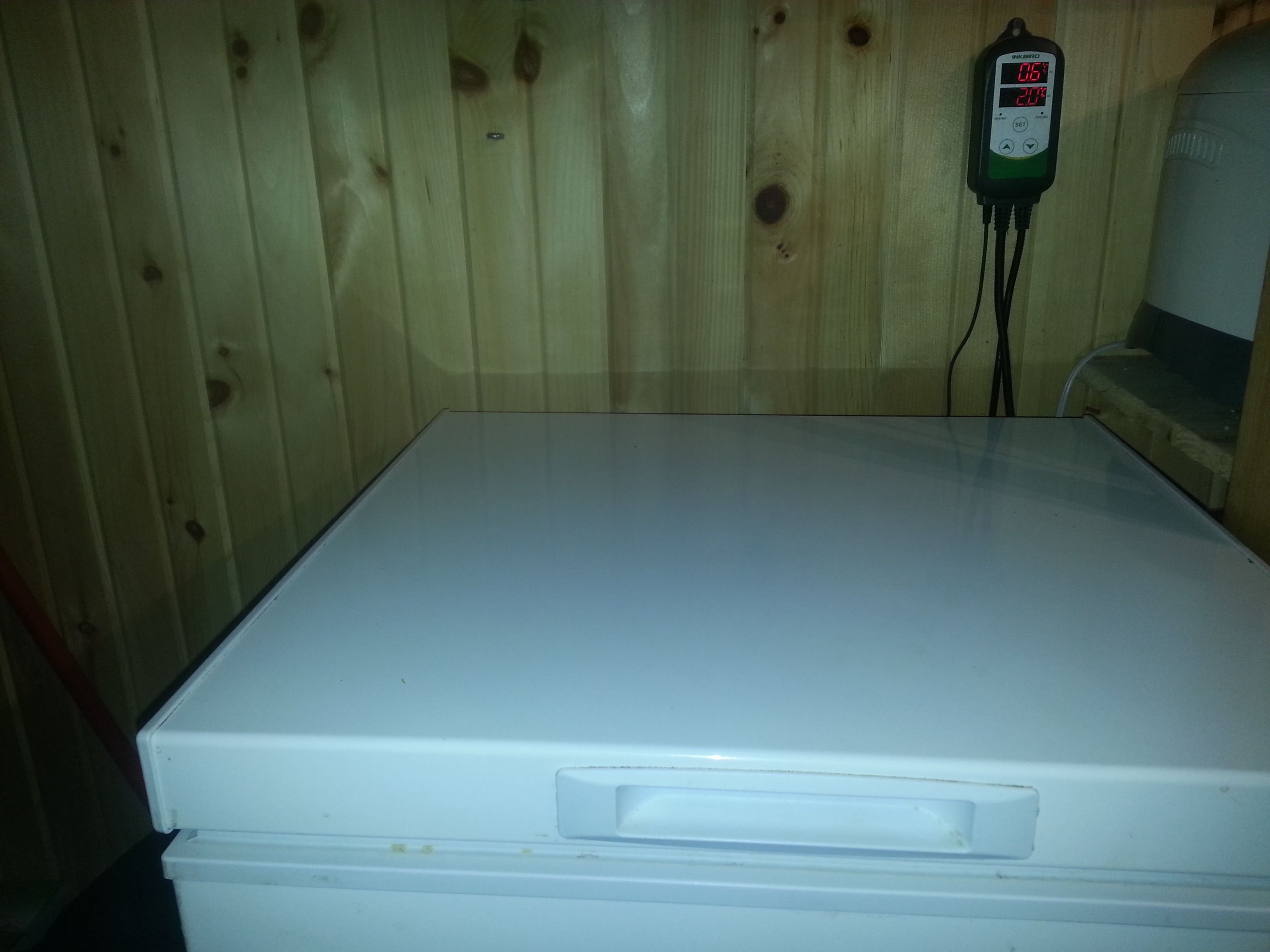
This spring/summer I will be digging a root cellar into the side of the hill behind the cabin. The plan is to put the refrigerator in the root cellar, running an extension cord from the cabin. Especially in the winter, the fridge would rarely even turn on.
The Ultimate Goal is to require No Electrical Refrigeration by eating fresh veggies from the garden in the spring and summer, then dining on root cellar veggies, sprouts, and microgreens in the fall and winter. Grains, beans, and farm fresh eggs from the planned chickens would be the staples.

Off Electrical Grid, but not Off Wireless Communications
For the First Month at the off-grid cabin, we had a cell phone with no internet because we were so used to having Wifi at home. At first all we had for outside news and entertainment was a digital AM/FM radio. When we first realized we had it, we plugged it in and tuned into a local radio station, it was like a breath of fresh air - we were already bored with the movies and TV shows that we had brought with us.
At the start of the Second Month we went to town and signed up for a local cell phone plan - with 10 gigs of Internet per month! After having no Internet, the 10 gigs was plenty enough for looking up news, weather, and other information, my wife's light facebooking, a decent amount of YouTube at 144p, and Amazon for odds and ends.
The Third Month we upgraded our setup to a stand alone wireless Internet hub router that connects to cell phone towers for the signal. This gave us 100 gigs per month, which was more than enough for web browsing, Netflix, Prime Video, YouTube, and eventually Steemit :)
More Time with Family and Friends
One of the greatest benefits we found from being able to retire early to the off-grid was that we had much more time to spend with the little one, family, and friends. Running a pizza shop we never had any time to visit, we were always busy working. We spent more time visiting friends and family in the first 3 months of off-grid retirement than we had the 3 years prior. It was a nice change of pace.
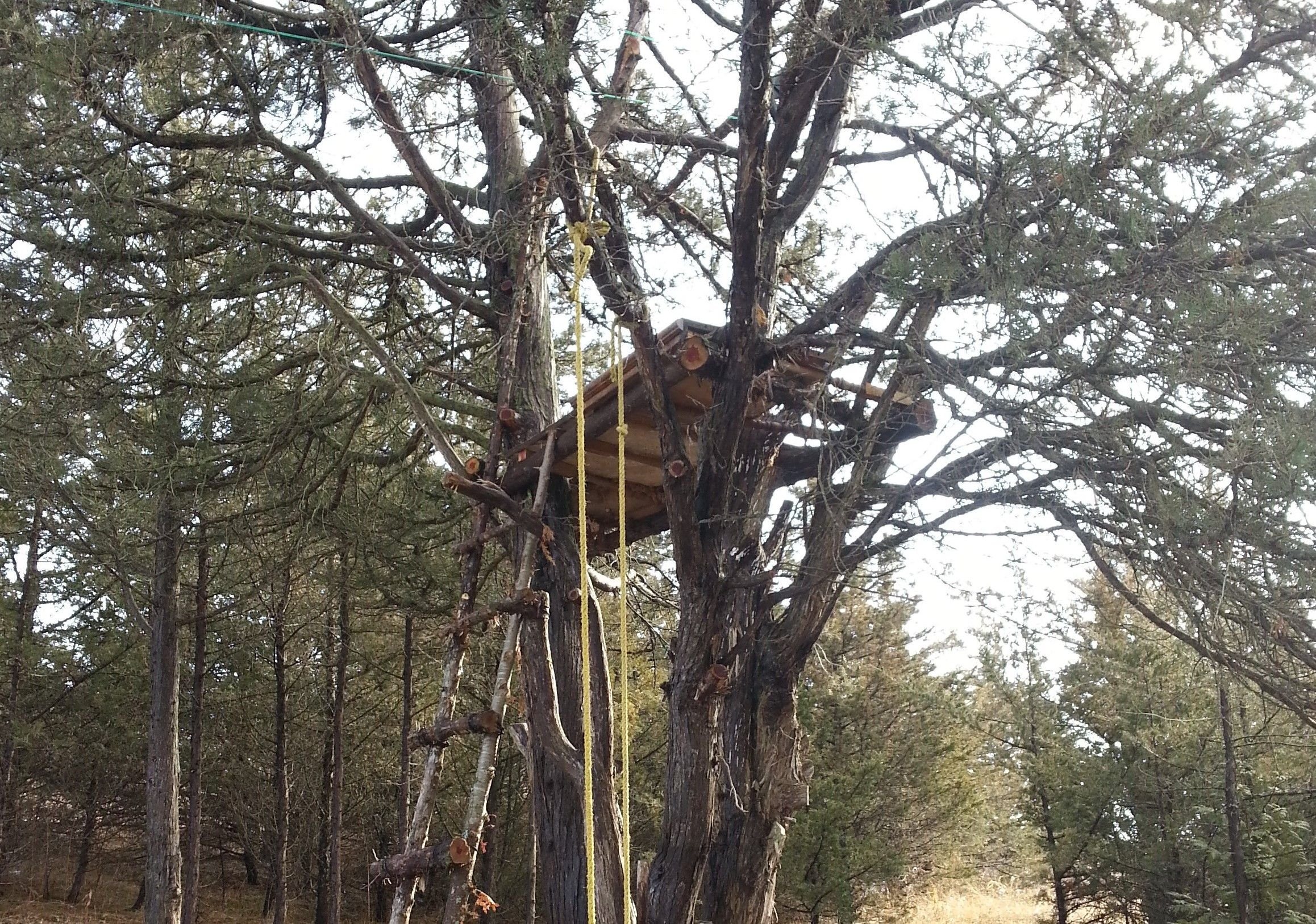
Having time to do multiple tasks throughout the day made the days seem twice as long. Above is a picture of the tree house my son and I built during the summer. He had to wait a week after asking until his request made it to the top of the never ending list of things to do when starting out, but we got it done - the cats love it too.
More Time with Nature
When we first were moving into the cabin, we noticed little holes in the grocery bags we had just dropped off, then we saw mice scurrying to under the cabin. After a couple days in the cabin, we let the cats out for the day time. We never again had a mouse problem.
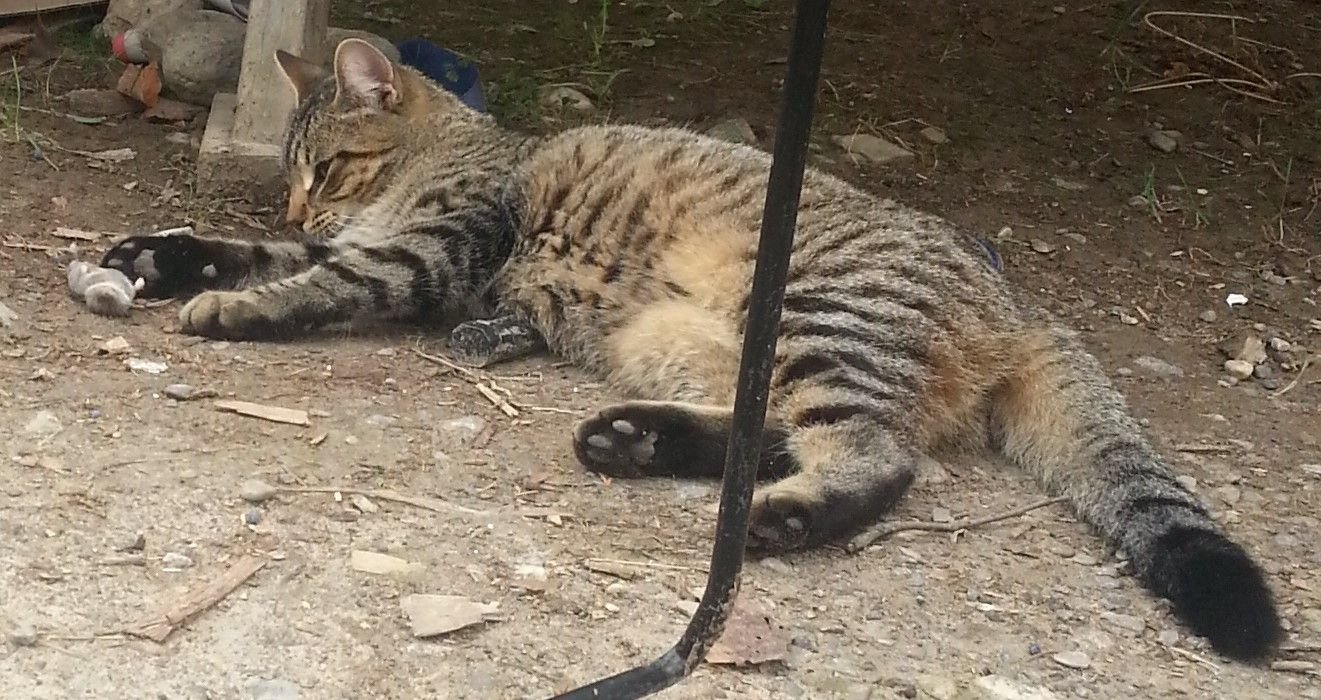
We do have a raccoon named Rocky that comes by the cabin to visit, we hear him fighting with other raccoons to keep them off this property. A skunk named Pepe that I've almost stepped on multiple times, each of our cats have learned not to mess with him. Multiple wild house cats, one named Will Feral. We are not bothered by these animals. They only come around because we are not always the best at picking up our left over food. They do a great job of it, they are like nature's housekeepers.
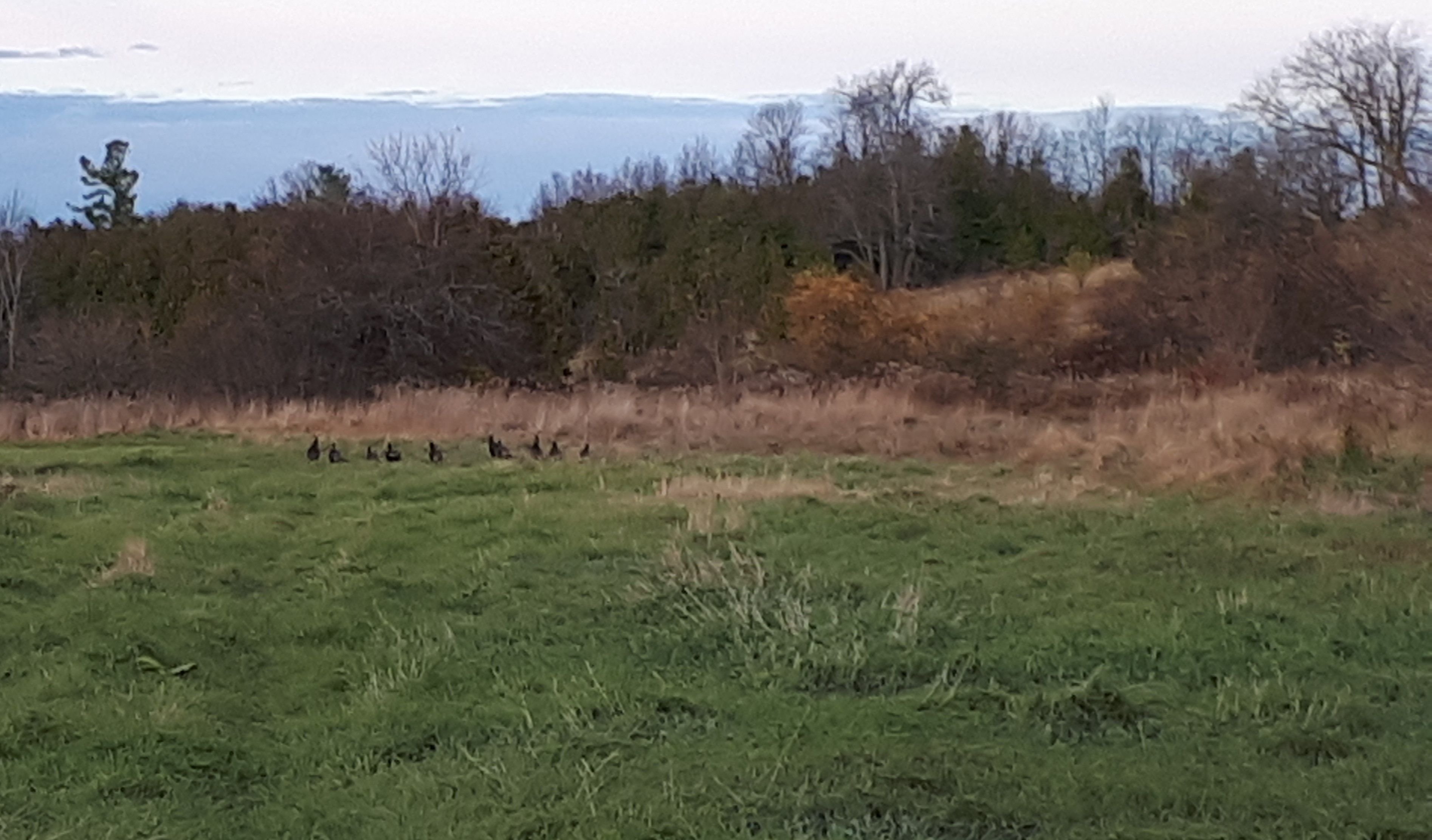
Above is a picture of wild turkeys walking by as we are waiting for the school bus.
We see lots of wild turkeys, and groups of deer that take turns crossing open pastures. This is cottage country, so there are no gun shots in this valley to scare them off. Many times we've brought the cats inside when we've seen hawks circling low. Whenever it snows, the coyotes come down from the north and howl through out the night. We're not too worried, they usually stay away from people, lights, and loud noises.
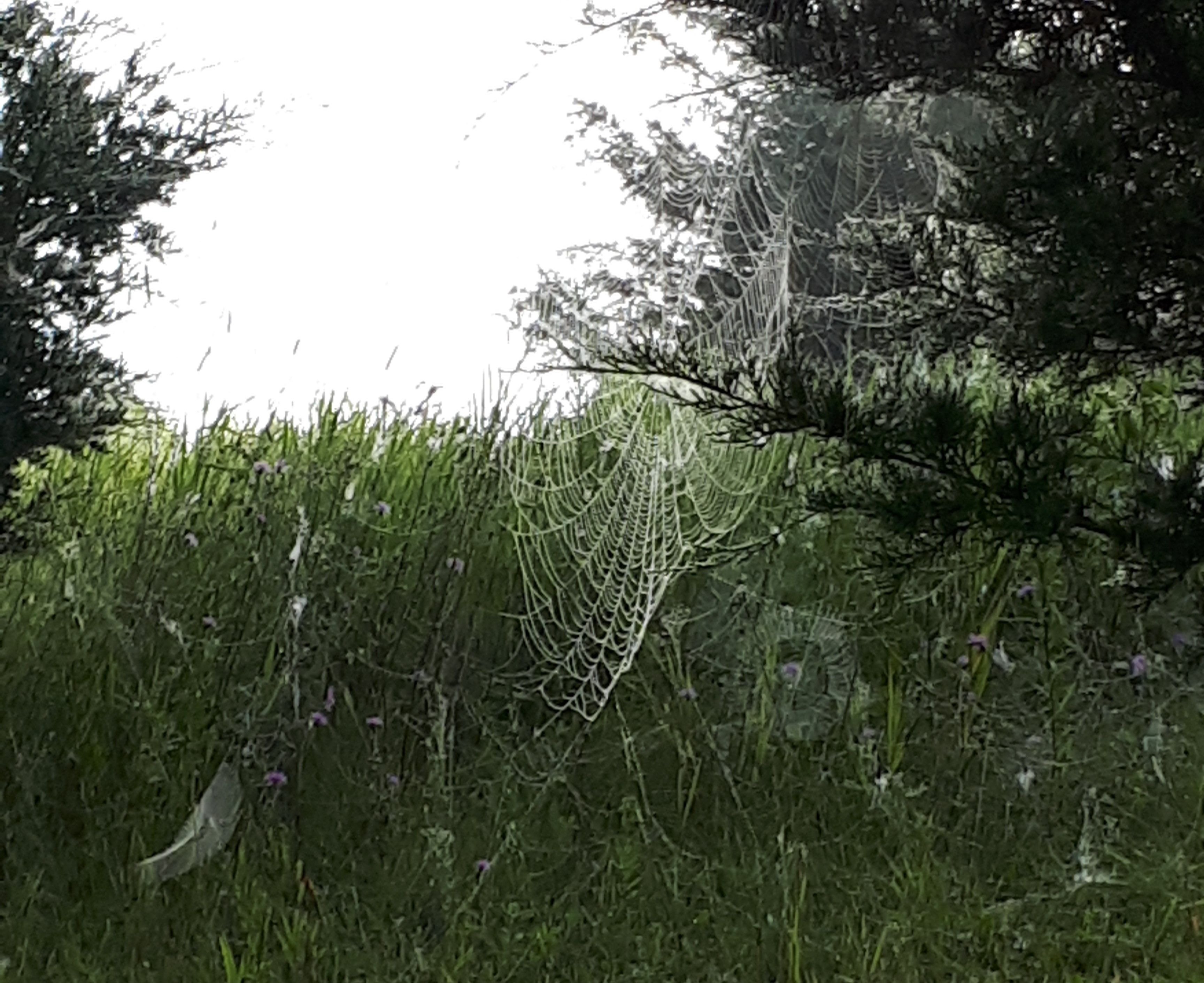
Our cabin is only 400 square feet. For three of us, it's cozy. In the summer we don't spend much time inside anyways. We've intimately gotten to know the sun, the moon, the seasons, and the weather. Above is a picture of one day this past summer/fall when a warm front moved in after a cold night. It caused an amazing amount of condensation to reveal every spider's web on the property. It was fun this past summer to watch the approaching storms.
There were black flies heavy in the earlier spring, but by the time we arrived it was mostly house flies and mosquitoes. We soon enough added a screen door to the cabin, first thing this spring we will be adding a screened in porch.
Food and Coffee
Until we have our self-sufficient modern off-grid homestead fully up and running, it's nice to have a little help. We have been very happy with our cooking setup, in the winter we mostly cook on the wood stove, but in the hot cabin summer we cook with propane.
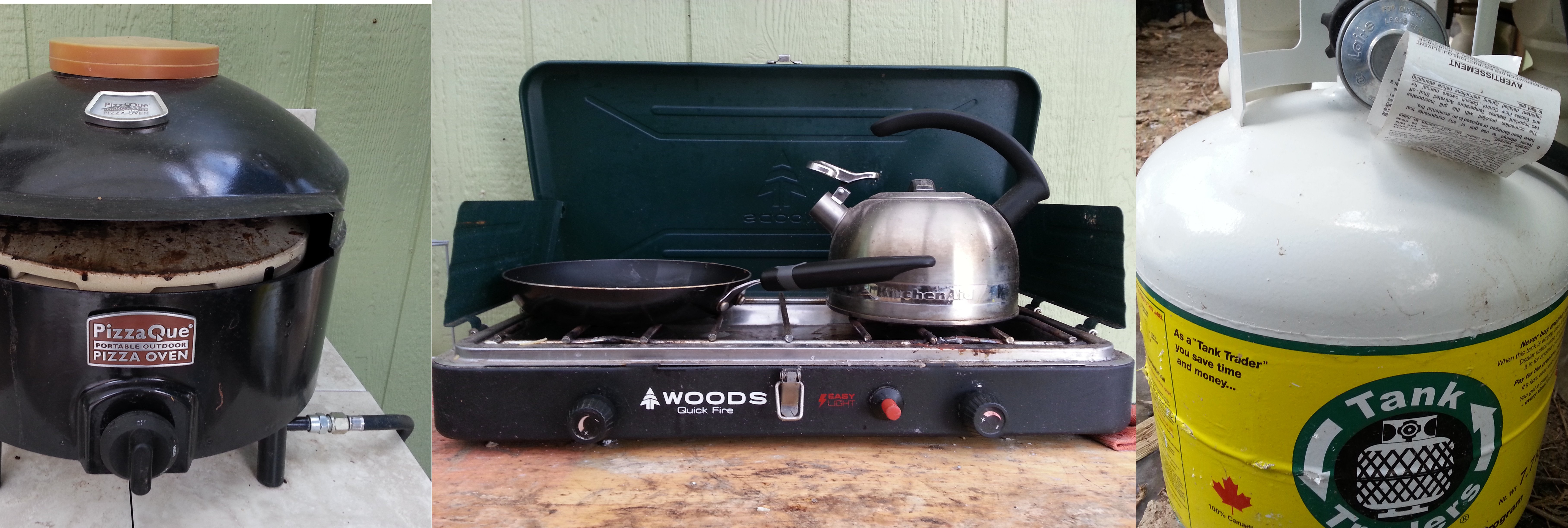
We spend about $30 every 2 months on propane, so it works out to about $180 per year. Not a high price to pay for the convenience of not having to start a fire whenever we need to cook food. It is especially convenient first thing in the morning for that first cup of coffee or tea - before the wood fire is started.
Fresh Water and Outdoor Plumbing
Our property did not come with a well, so far we have been bringing in cases and jugs of drinking and cooking water. Before winter we installed a 1000 gallon underground cistern for drinking water. This spring we will accept our first delivery, that water will last us for more than half of the year. For our dish washing, bathing, and clothes washing needs, we collect and boil rain water. Our first method of this was the chiminea boiler, see the picture below.
.jpg)
In the picture below you see where the long juniper branches are fed into the much more efficient Rocket Stove Boiler.
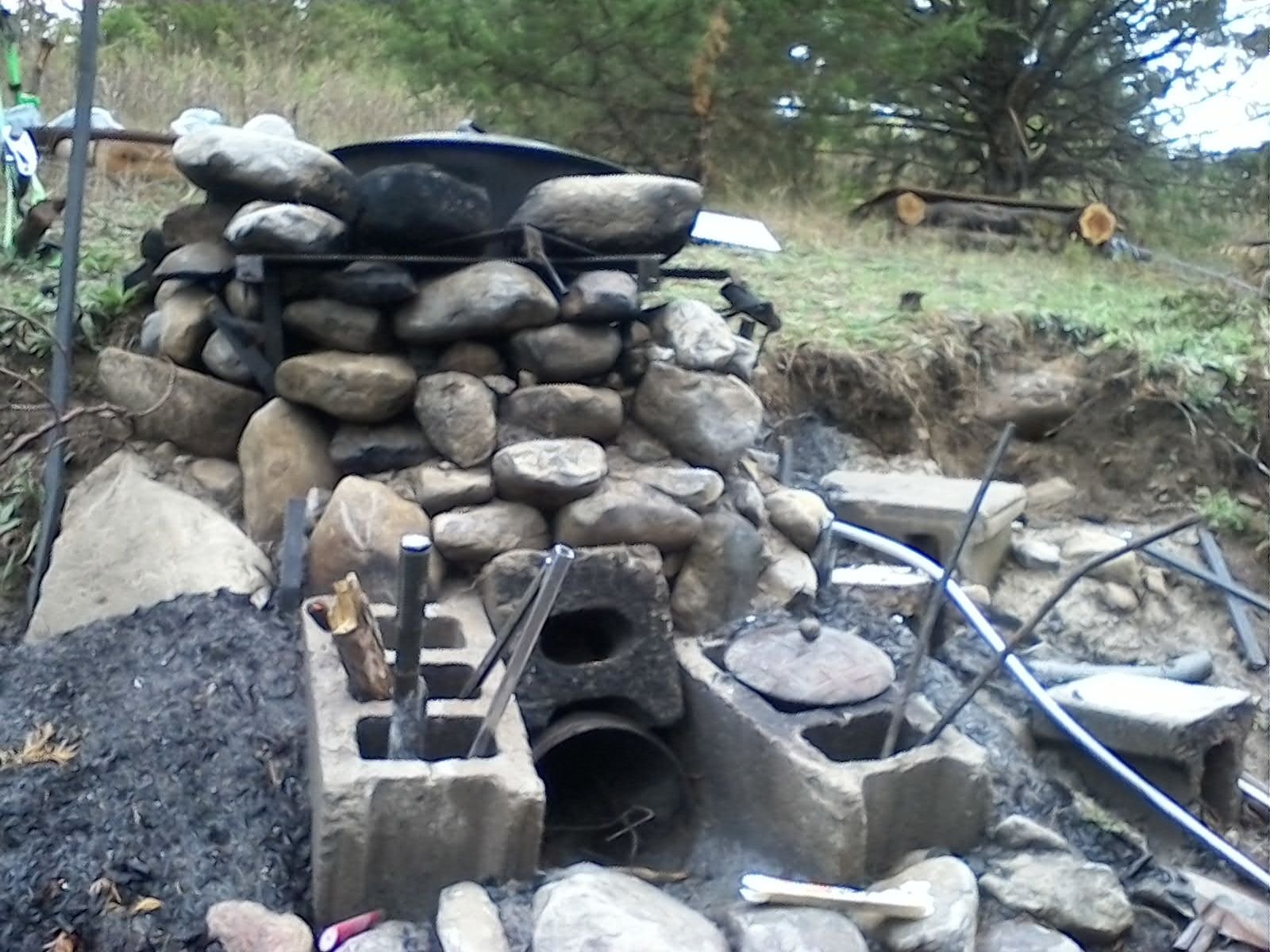
The rocket stove boiler is dug into the side of the hill, up the hill from the cabin. We used standard garden hoses with connectors and valves to control when we wanted the gravity fed water for outdoor hot showers, laundry, or dishes.
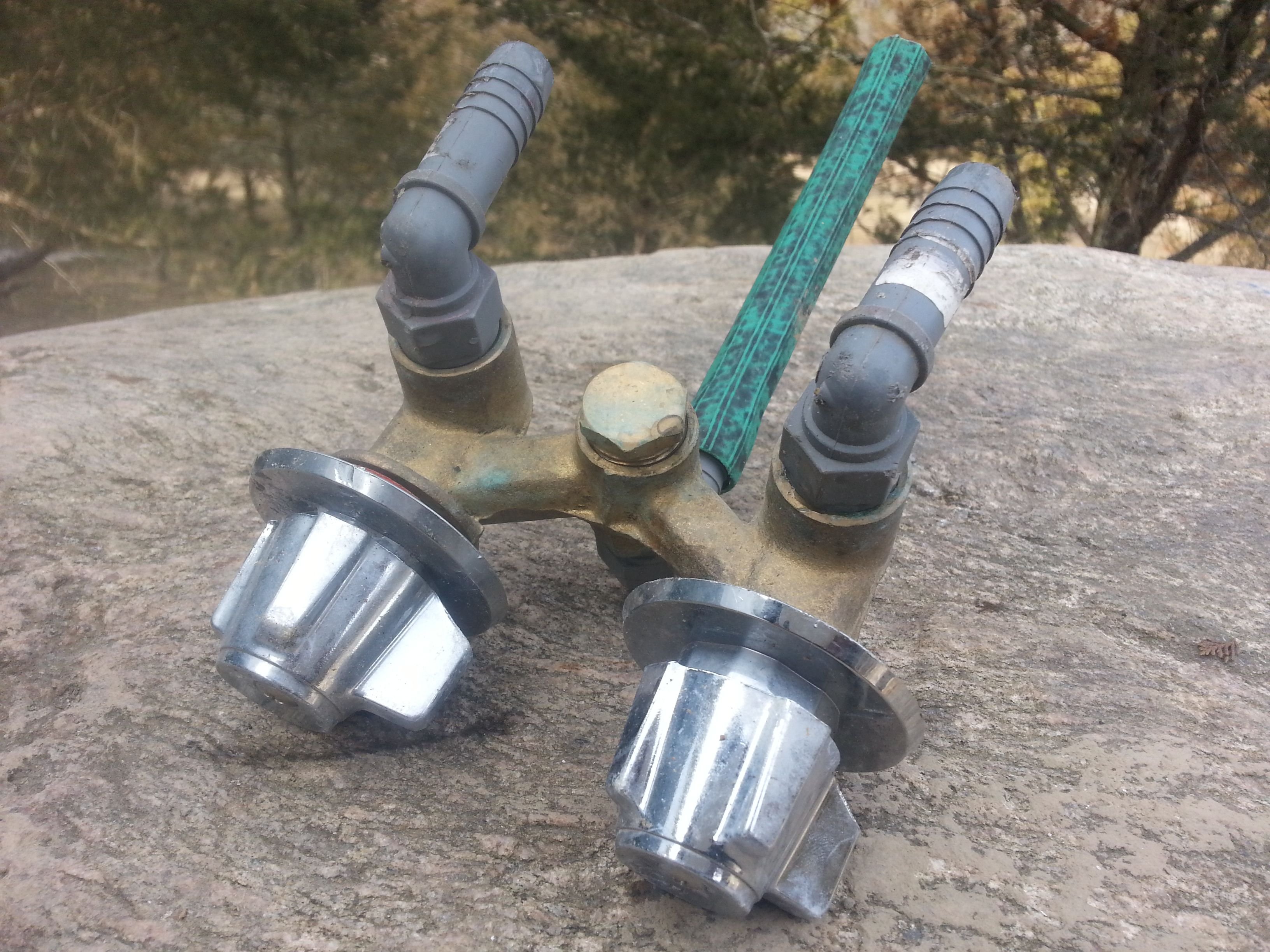
Need Time to Relax
Especially when starting such a large undertaking, it's easy to forget leaving time to relax. We didn't move out here until the middle of summer, so there was not enough time to put in the gardens. I mostly focused on landscaping which involved lawn mowing, trimming lower branches, and hauling lower branches across the property. It was hard work and I was doing it in the hot sun, I got overheated. Not medically dangerously overheated, but I was getting grouchy. After apologizing to my wife, I changed my work schedule to avoid the hot sun. I made a point of giving myself time to relax and eat more food, this was more work than I was use to. Of course sleep has a lot to do with mood as well, but after working all day outside - I had no trouble sleeping.
Below is a picture of my lazy cat having no trouble relaxing :)

Enter the Lawn Tractor and Wagon
My biggest lawn care mistake was that I started with a plug in push lawnmower. It only had enough juice to run when the blazing hot sun was on the solar panels - and me. I had plans to purchase a riding tractor lawnmower first thing when we moved out here, but it was hard with no Internet. We happened to drive past a lawn tractor mechanic's house while driving home on a country road. He only dealt with older Craftsman brand, they have more towing power than the newer hydrolic lawnmowers. That's how he explained it to me. This tractor has two cylinders and has proven it's worth.
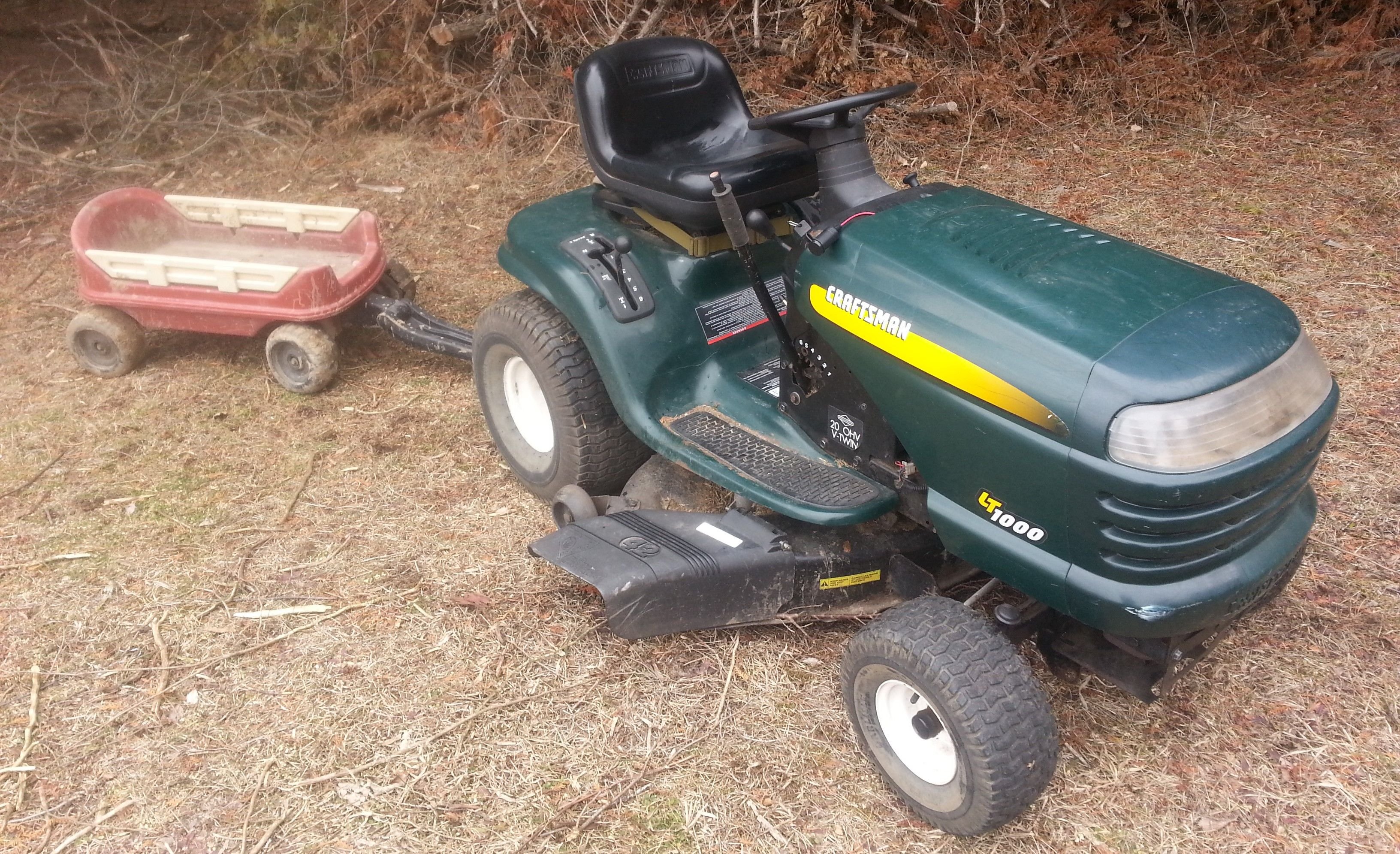
Soon enough I will upgrade the wagon. I also have a tow strap for pulling around branch piles and pulling down dead trees. So much easier mowing the lawn than with the push mower. It's worth paying for the dollars of gas when I'm not exhausted at the end of the day.
It's not just visual beauty of the sunset that is romantic, but also the time spent outside and having the leisure time to watch it.
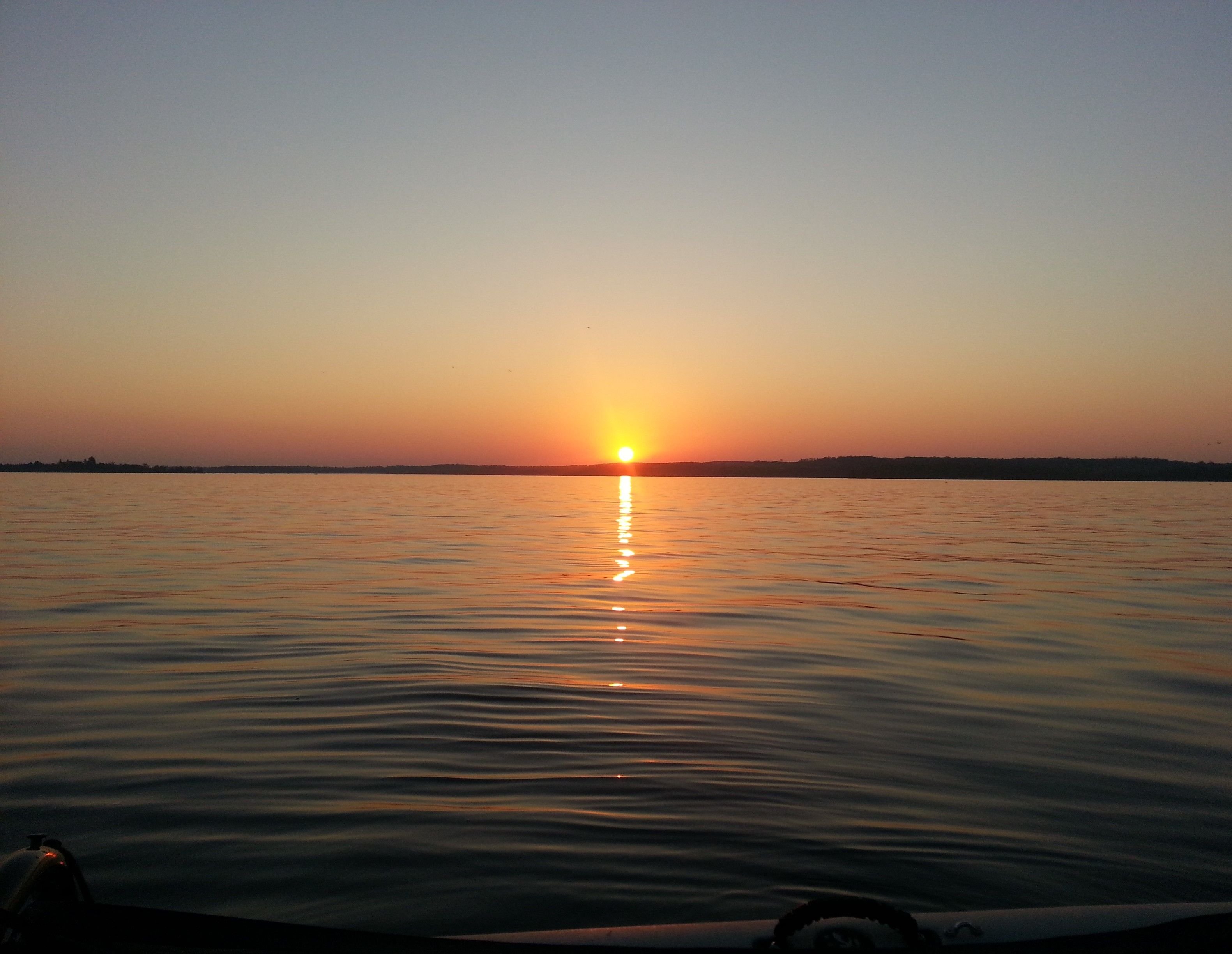
The next post of this 2 part series will cover the Winter Months of our first 8 months of off-grid living.
You may find these previous posts useful:
-@jackdub/off-grid-the-winter-months-our-first-8-months-of-off-grid-living-part-2
-@jackdub/sunset-valley-acres-our-first-8-months-off-grid-part-1-and-2-coming-this-week
-@jackdub/prepare-water-containment-for-emergency-conservation-and-off-grid-living
Have a great day!
